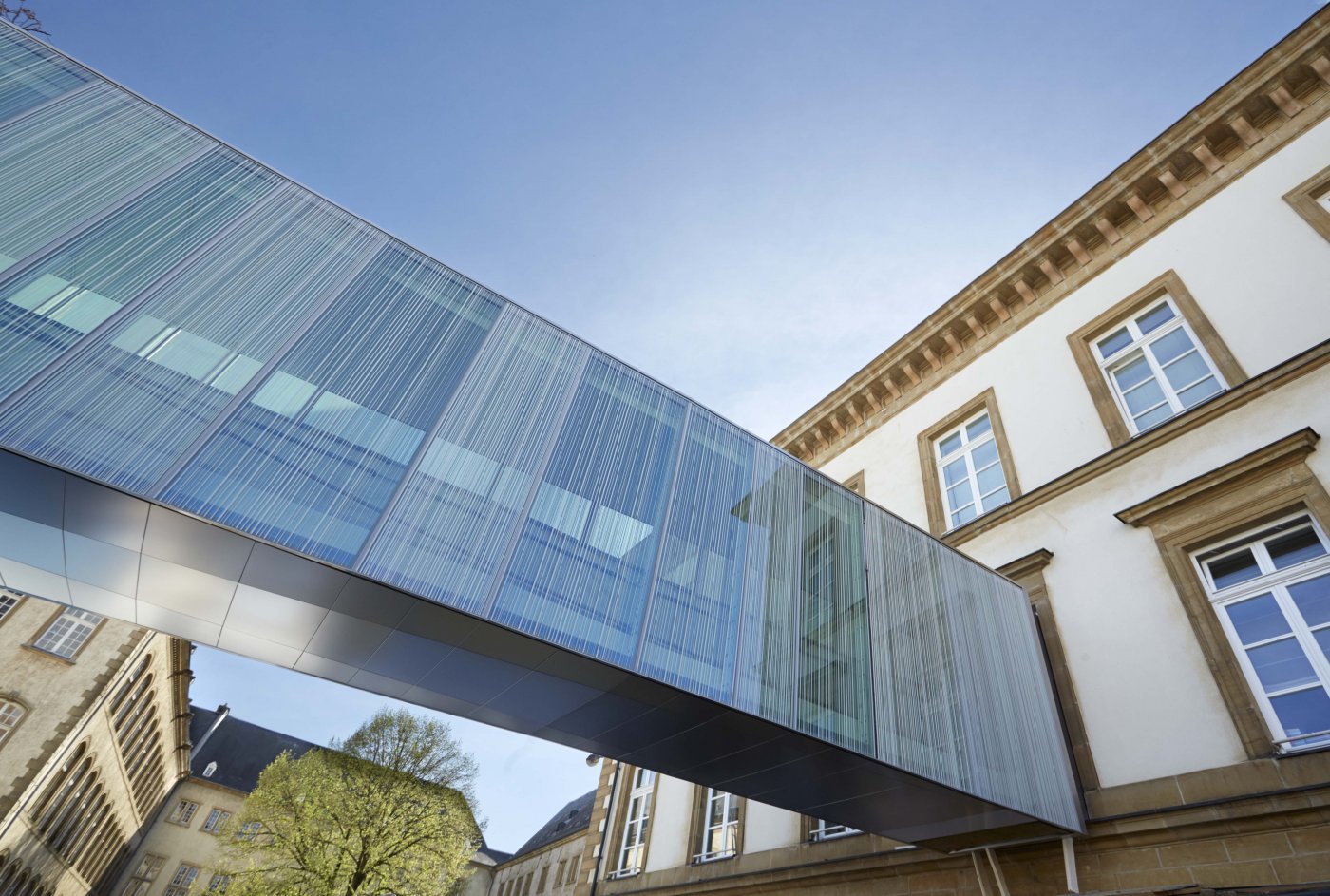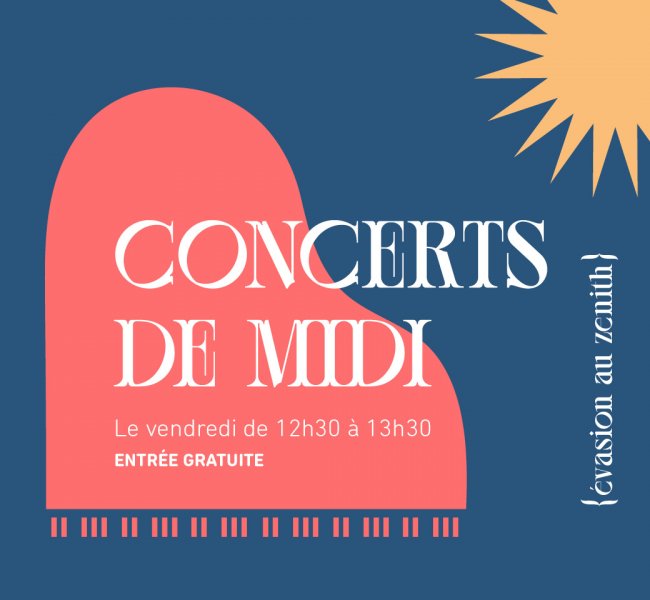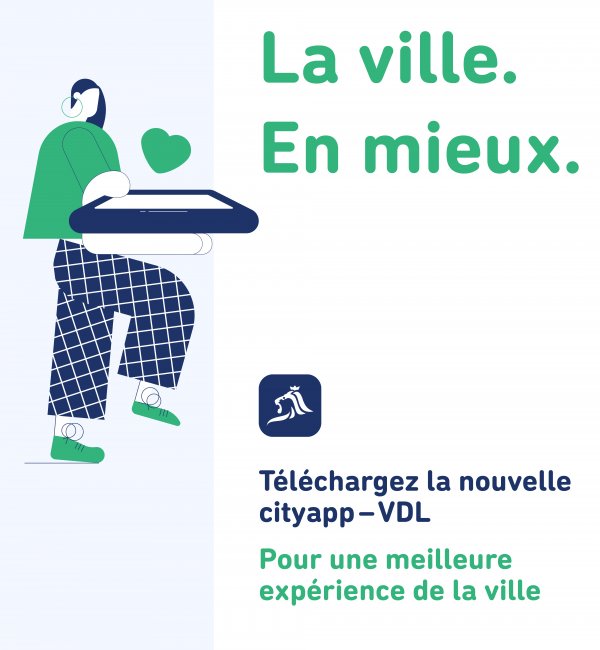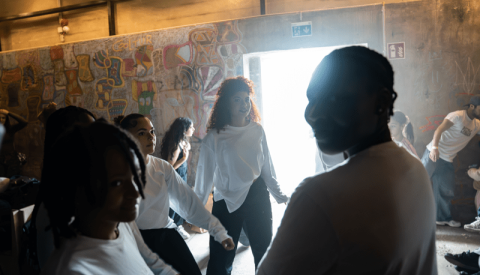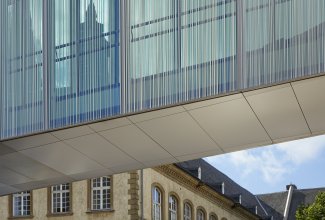Closed session
1. Administrative Committee of City of Luxembourg Hospices Civils: appointment of a new member following the resignation of Vronny Bock-Krieps
2. Social Welfare Office (Office social): personnel matters – opinion.
3. Personnel matters – decision.
Open session
4. Questions asked by Municipal Councillors.
5. Traffic: permanent amendments to the traffic regulations – temporary regulations – confirmation of temporary regulations – decision.
6. Agreements – approval.
7. Municipal Council's opinion on the implementation of a video surveillance zone in zone G – Bonnevoie.
8. Work estimate – approval.
- Special budget project for the deployment of the VISUPOL network – Zone G in the Bonnevoie district
- Project to upgrade Montée des Tilleuls
9. Urban development – decision.
- Minor amendment to the PAP QE "secteur protégé du Pfaffenthal [SPR-pf]" – 9, rue des Trois Glands
- Minor amendment to the PAG (referral) – PAP NQ "Rue des Ligures [ME-10]"
10. Allocation of grants – decision.
11. Motion tabled by the Déi Lénk political group calling for strict limits on night flights at Luxembourg airport – presentation.
12. Resolution by the City of Luxembourg Municipal Council confirming Luxembourg City as an LGBTIQ+ Freedom Zone – presentation and vote.
13. Office social (Social Welfare Office): deed of retrocession of a perpetual leasehold – sale of a plot of land – opinion.
14. Legal affairs: authorisations to initiate legal proceedings – decision.
15. Creation/elimination of staff positions – decision.
Live broadcast of meetings
Watch the video recording of this session.
Summary record
The summary record is a transcript of the discussions held and decisions taken by the Municipal Council. As such, it is an important source of information for citizens of the capital with regard to projects and measures that may have an impact on their daily life.
The summary record of this session will be made available shortly.
Keep reading
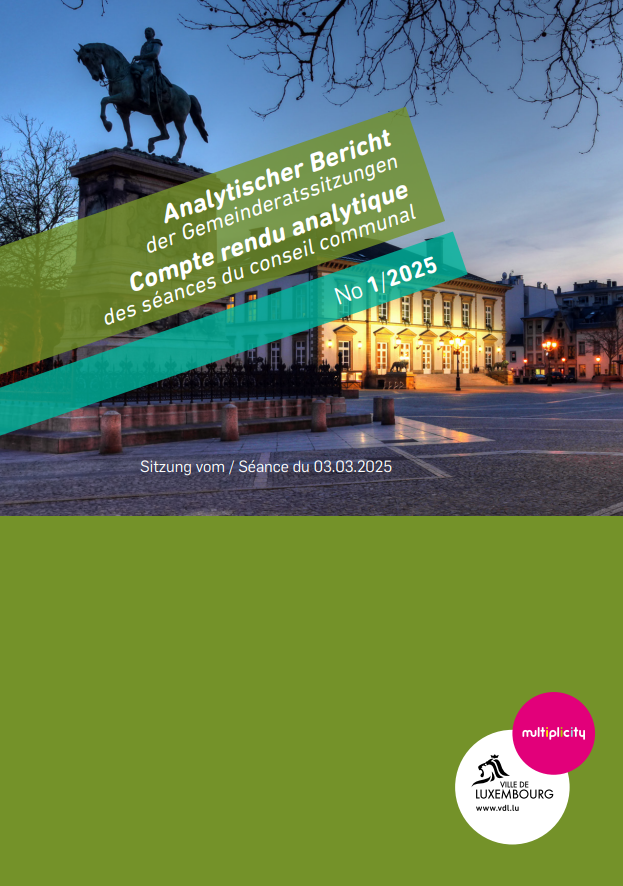
Keep reading

Questions asked by Municipal Councillors
Unforeseen closures of the Pfaffenthal elevator
Question posed by François Benoy
From what I have been told, it appears that the Pfaffenthal elevator was taken out of service several times in the past few weeks, outside the normal monthly maintenance times. Such closures are especially inconvenient for users and should therefore be avoided.
- Can the College of Alderman confirm that these unanticipated closures did in fact take place in the past few weeks? How many times was the elevator taken out of service? Why?
- How many times was the elevator taken out of service due to unforeseen circumstances in 2024? Why?
- What steps has the College of Aldermen taken to prevent these unforeseen closures?
- From what I have been told, it appears that the CityApp notification that is sent out when the elevator is out of service due to unforeseen circumstances is not entirely reliable. What steps does the College of Aldermen intend to take to improve this situation?
Response provided by Alderwoman Simone Beissel
Between 1 December 2024 and 10 January 2025, the elevator was inoperative on six occasions. Three of these closures were due to technical issues (an issue with a pulley wheel, sensor or connection), while the other three were due to weather conditions (frost, ice and snow). Schindler, the company that installed the elevator and is responsible for maintaining it, responded quickly every time and completed the repairs within a matter of hours, or within a day at most. In 2024, the elevator had to be taken out of service 12 times due to unforeseen circumstances. Technical issues were the reason for eight of these closures; the other four closures were due to weather conditions. Given that there are often problems with the elevator doors, the company has increased the frequency of its site visits to lubricate the doors and treat the locks with an antifreeze lubricant. In 2024, a glass slab at the end of the walkway and a cracked pane of glass in the elevator car were also replaced.
The information posted in the CityApp comes from the elevator operator. The status can be changed from "open" to "closed" from the attendant's booth. The City has asked the company to remind on-site staff to always post status changes.
Study areas for young people
Question posed by Maxime Miltgen
The City Bibliothèque is essential for many young people, especially high-school students studying for the baccalauréat exam and university students looking for a quiet place to study. However, there are several challenges. Space is limited, so it is sometimes hard to find a place to study. Noise levels are high in some areas sections of the library, which makes it difficult for students to concentrate. The National Library of Luxembourg has dedicated study areas, but due to high demand they are often full. Many young people who don't have enough space or nowhere quiet to study at home rely on these public spaces.
- Does the College of Aldermen plan to create more spaces for students in the city, especially quiet study areas?
- Are there any plans to extend the existing study areas in the City Bibliothèque to cater to the rising demand?
- Would it be feasible to partner with other institutions – such as schools, childcare centres, cultural centres or sports centres – to provide young people with more spaces where they can study during exam periods?
- Does the College of Aldermen plan to implement any measures to reduce noise levels in existing spaces, so as to create an environment that is conducive to studying?
Response provided by Mayor Lydie Polfer
Since it opened 17 years ago, the City Bibliothèque has become a victim of its own success. The City is aware of the problems described by Councillor Miltgen and is doing its best to resolve them.
The library is used by a wide range of people with different user profiles. Some students go to the library to study alone in a quiet setting, while other students go there to study in groups. Following discussions, we decided to create a soundproofed cubicle where four people can work together. We are also reaching out to some groups to ask them to use other spaces. For example, we have made arrangements for elementary school classes and other groups of children to use rooms on the fifth floor of the Cercle Cité building.
In theory, additional workstations could be installed in the lobby of the library, but that would be at the expense of other library users, such as people who go to the library to read newspapers and often stay there for a long time. We do not wish to impose limits on how long people can stay in the library.
The idea of working with other institutions, such as youth centres, is not a bad one, but the activities held in those kinds of places are generally not quiet. We will continue to look for the best possible solutions.
Installation of water softeners
Question posed by David Wagner
Since the City started sourcing more drinking water from its own springs – which are loaded with minerals from the Luxembourg sandstone aquifer – and to a lesser extent, water from the Haute-Sûre dam (SEBES), the hardness of the city's water has increased considerably in some districts. In addition to Merl and Belair, where water hardness levels have been high for many years, other zones, particularly zones 2 and 8 in Cessange, and part of Kirchberg (new zone 11), have been affected by this change. In all of these districts, water hardness levels now exceeds 18°dH (German standard). With the increase in the water hardness, mineral deposits are forming inside pipes, heating systems, heat exchangers and appliances that use water hotter than 50°C. As the deposits are damaging these systems, installing a water softener should be considered in areas with water hardness levels of 17 dH or more. However, private water softening systems are expensive, and people who know little or nothing about such systems often find themselves dealing with self-professed experts who are more interested in making as much money as they can.
Consequently, in early February 2022, the College of Aldermen asked the City's Service Eaux (Water Department) to conduct a study on the feasibility of installing water softening systems at the four pumping stations in Pulvermühl, Glaasburen, Birelergrund and Mühlenbach, with the aim of providing softer drinking water in the different zones. In its 2023 activity report, the department concluded that a nanofiltration system would be the best softening method, and consultancy firms have proposed solutions for installing this type of system at the pumping stations.
What is the College of Aldermen's position on installing water softening systems at the City's pumping stations? How long would it take to do this, and when will residents in areas with high hardness levels be informed?
Response provided by Alderwoman Simone Beissel
The City's drinking water supply network is broken down into 11 zones. To become more self-sufficient with regard to drinking water, the City is doing all it can to increase the share of water that comes from its own springs and, consequently, reduce the share of water supplied by SEBES. Around a decade ago, the share of water supplied by SEBES was increased, following the discovery of metazachlor-ESA in the water from certain springs. Currently, around half of our water comes from our springs, and the other half comes from SEBES.
Spring water is quite hard because it runs through parts of the sandstone aquifer. Its hardness ranges from 16 dH to 19 dH in zone 2, from 15 dH to 17.5 dH in zone 8, and from 13.5 dH to 16.5 dH in zone 11. I would like to stress that higher hardness levels are not a sign of poor quality, but quite the opposite: hard water has health benefits because it contains mineral salts, especially calcium and magnesium.
On the other hand, it is true that hard water causes calcium deposits in machines and systems. To prevent these deposits from forming, it is recommended that boilers be set to a temperature of between 55°C and 59°C, and washing machines to below 60°C, and that the salt used in dishwashers be replenished regularly.
So, the City plans to install several water softening stations, with a view to bringing hardness levels down to less than 11 dH in all of the City's supply zones. Specialist consultancy firms have advised the City to use the nanofiltration method. Water treatment plants will be installed at the Pulvermühl, Glaasburen, Birelergronn and Mühlenbach pumping stations. This will be done in stages, with the Pulvermühl water treatment plant serving as the pilot project.
Rental of individual rooms
Question posed by David Wagner
Article 1 "Habitation zone 1 [HAB-1]" of Chapter 1 "Method of use of urban areas or areas earmarked for urban development" of the City's General Development Plan (Plan d'aménagement général – PAG) states that habitation zone 1 is earmarked for single-family, two-family or multi-family homes. The number of accommodation units allowed in multi-family homes must match the number of floors in the house. Full floors, as well as the first floor located above the last full floor, are taken into account for this calculation. In existing cafés, lodgings are permitted on the upper floors".
However, it turns out that, for several years, to increase rental income, single-family homes are often subdivided into separate rooms that are rented out individually, so that the number of individual rental units significantly exceeds the number of floors in the house. To be clear, I am not talking about house shares (Wohngemeinschaft), but rather, cases where each tenant of a separate room signs a lease with the owner.
- Is the City aware of these practises, which are an infringement of the PAG regulations?
- If so, what does it intend to do to ensure compliance with the PAG?
- If not, what checks does it intend to put in place to ensure compliance with the PAG?
Response provided by Mayor Lydie Polfer
This is a very sensitive issue, and existing case law does not really make things any easier. Councillor Wagner correctly cited the provisions of our PAG, which state that one accommodation unit can be created per floor in a "HAB-1" habitation zone. What we now need to do is define the term "accommodation unit". Even if we are talking about "single-family homes", the term "accommodation unit" is not defined in terms of occupants. The definition reads as follows: "The term 'accommodation unit' refers to a set of rooms intended for residential use, which form a single unit and which include at least one living room, a kitchenette, and a bathroom with a toilet." (This is the definition that appears in Appendix II of the Grand Ducal Regulation of 8 March 2017 on the content of PAPs for existing districts [PAP quartier existant] and PAPs for new districts [PAP nouveau quartier].)
On this topic, a precedent in case law dating back to 8 January 2018 states that renting individual rooms does not change the status of a single-family home which they are part of, and does not correspond to a change in use of the home.
Nonetheless, we are aware of the situation that Councillor Wagner described, and we agree that the proliferation of accommodation units in single-family homes is undesirable, and may be inappropriate for the district.
Our inspections of furnished rooms may be a way to monitor this situation. In fact, homeowners are supposed to seek the City's permission to rent one or more furnished rooms. There is a set of criteria that must be satisfied, including a requirement for accommodation units to have a second evacuation exit on the same floor. A City committee carries out frequent inspections – often based on information provided by neighbours – to check whether the provisions of the regulations on furnished rooms are being complied with.
So, in this case, we need to know the definition of an accommodation unit.
If an owner applies to change the use of their home, but keeps the same number of rooms and fits some of them out with a bathroom and a kitchenette, these rooms would be considered as accommodation units, and it would not be possible to have three of these units on the same floor.
Article 13, paragraph 3 of the Municipal Law establishes that each member of the Municipal Council, acting in their individual capacity, shall enjoy the right of initiative to add to the agenda drawn up by the College of Aldermen one or more proposals that they wish to submit to the Municipal Council.
Such proposals must be submitted to the Mayor in the form of a written reasoned request at least three days before the meeting of the Municipal Council.
